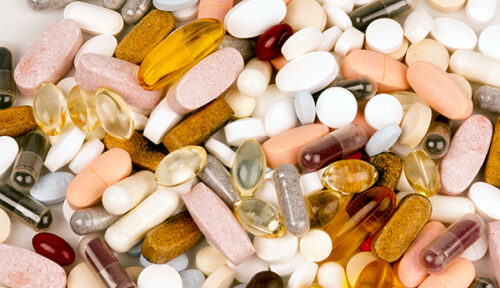My Favorite 5 Articles from the November 2003 Newsletter
My Favorite 5 Articles for this Month
All articles are chosen for the relevance of people’s need for greater knowledge for better health.
Treatment of Blood Pressure Can Make You Stupid ”Blood pressure and cognitive functioning among independent elderly” by Esther Paron in the October 2003 issue of the American Journal of Hypertension, found low blood pressure was associated with poor thinking, and mild hypertension was associated with better thinking.1 Over-aggressive lowering of blood pressure with medication was thought to decrease the flow of blood to the brain. By this means, function of the brain in the elderly was thought to be impaired. The best brain function was associated with a blood pressure of about 159/85 mm Hg. These findings are consistent with research that shows an increase in risk of stroke and heart attacks by over-aggressive treatment of blood pressure with medications.2,3 (Lowering blood pressure too much with medications decreases the perfusion pressure of blood to the heart and other vital tissues causing these organs to become ill.) Too many doctors have been educated by the drug companies that the goal of blood pressure treatment is to achieve a ”normal” pressure of 110/70 mm Hg or lower and that can be a dumb and deadly recommendation. With medication blood pressure should not be brought down below 140/85 mm Hg. Without medication, an ideal blood pressure is 110/70 mm Hg or lower – this is best achieved with a healthy diet and lifestyle (exercise, no coffee, no alcohol, etc.). 1) Paran E. Blood pressure and cognitive functioning among independent elderly. Am J Hypertens. 2003 Oct;16(10):818-26. 2) Voko Z. J-shaped relation between blood pressure and stroke in treated hypertensives. Hypertension. 1999 Dec;34(6):1181-5. 3) Cruickshank JM. Coronary flow reserve and the J curve relation between diastolic blood pressure and myocardial infarction. BMJ. 1988 Nov 12;297(6658):1227-30.
Pharmaceutical Industries Selectively Report (Lie about) Scientific Findings ”Industry-sponsored economic studies in oncology vs. studies sponsored by nonprofit organizations” by M. Hartman in the October 2003 issue of the British Journal of Cancer found drug companies manipulate research findings in order to support their products (Big surprise). Three times as many studies with positive rather than negative conclusions about costs of cancer drugs were published in medical journals. Furthermore, if a study was sponsored by a drug company it was twice as likely to show positive results as studies sponsored by nonprofit organizations. These studies directly influence prescribing practices of doctors, and as a result, not only cheat patients out of their money, but this dishonesty also physically harms patients. The authors of this review recommended full disclosure of the financial influences of all research. The influence of the pharmaceutical industries on research is so pervasive and powerful that I no longer know what to believe about the benefits and harms of drugs on the marketplace. The best advice I can give patients is to be well and in this manner avoid the medical and pharmaceutical industries as much as possible. Always question your doctor about the need for you to be placed on or to continue every medication. Doctors are afraid to reduce and stop medications because that is how they have been educated by the drug companies to practice – so you have to take the lead if any changes are going to be made. Hartmann M. Industry-sponsored economic studies in oncology vs studies sponsored by nonprofit organisations. Br J Cancer. 2003 Oct 20;89(8):1405-8.
Do Microwave Ovens Destroy Nutrients in Food? ”Phenolic compound contents in edible parts of broccoli inflorescences after domestic cooking” by F. Vallejo in the October 2003 issue of the Journal of Science, Food and Agriculture found cooking by various methods destroyed, to different degrees, potentially healthful natural plant chemicals, such as flavonoids. Loss of Flavonoids from Broccoli: Microwave 97% Boiling 66% Pressure Cooking 47% Light steaming was found to be the preferred way to preserve these chemicals. Raw would be the best. These finding caused the emotions of opponents of microwave cooking to overflow with excitement. Headlines over the Internet read, ”Microwave cooking is bad for your health.” However, as this paper goes on to point out, other studies do not show a high loss of these substances with microwaving. For example, the following two studies show microwave cooking is better at preserving flavonoids than other methods: 1) Loss of Flavonoid compound from Potatoes: Baked 100% Microwave 45% Boiling 60% 2) Loss of Flavonoids from Tomatoes: Microwave 65% Boiling 82% Natural plant chemicals (phytochemicals) play an important role in preventing cancer and artery disease (atherosclerosis, like stroke and heart attack); therefore, efforts should be made to preserve these substances. The best way to accomplish this is to eat the fruits and vegetables lightly cooked or raw. Other nutrients, such as vitamins, are also affected by all methods of cooking. But even so, plant foods are so overabundantly supplied with nutrients that even thoroughly cooked they provide excellent nutrition. The microwave has been the focus of many attacks, but concerns are usually unsupported by the scientific facts. After looking over the present data, I still conclude that microwave cooking is as safe as other methods of cooking. Research has been extensive over the last 50 years, so I doubt any future studies will cause a shift in my position. (Do avoid having microwaves contact you by making sure your oven does not leak.) Vallejo F. Phenolic compound contents in edible parts of broccoli inflorescences after domestic cooking. J Sci Food Agric (2003) 83:1151-16.
Take a Tomato, Not a Pill, for Your Prostate carcinogenesis in N-methyl-N-nitrosourea (NMU)-testosterone-treated rats fed tomato powder, lycopene, or energy-restricted diets by Thomas Boileau in the November 5, 2003 issue of the Journal of the National Cancer Institute found tomatoes with all their nutrients reduced the development of prostate cancer in male rats – but feeding the individual nutrient, lycopene, had no benefit. Increased consumption of tomato products and greater blood concentrations of lycopene, the principle carotenoid in tomatoes, are associated with less prostate cancer in men. Therefore, some scientists, and many manufacturers of supplements, conclude the solution to prostate cancer is to have men take capsules filled with manufactured lycopene to prevent this cancer. Not so! For this benefit men need to eat the lycopene in its natural packages – along with hundreds of other valuable plant chemicals (phytonutrients) – all present in the natural food in proper balance and proportion. The majority of lycopene intake (82%) in men in America is tomatoes. However, all other yellow and orange fruits and vegetables contain these valuable carotenoids. I am not surprised that taking lycopene supplements to prevent and treat prostate is a wasted effort – see my lead article in my July 2003 Newsletter. For real cancer and heart disease prevention you must focus on fruits and vegetables, which is, harder than taking a pill and without much profit for any industry – but that action works. Boileau TW . Prostate carcinogenesis in N-methyl-N-nitrosourea (NMU)-testosterone-treated rats fed tomato powder, lycopene, or energy-restricted diets. J Natl Cancer Inst. 2003 Nov 5;95(21):1578-86.
Don’t Stop Aspirin if You Are a Heart Patient Aspirin withdrawal increases risk of heart problems by Kathryn Senior in the November 8, 2003 issue of the Lancet reported on a study presented at a recent American College of Chest Physicians Conference which showed people who suddenly stopped taking aspirin had an increased risk of heart attacks and other serious heart problems. A doctor’s recommendation – like to prevent bleeding during a scheduled operation – was a frequent reason for stopping the aspirin. Aspirin is beneficial for preventing future heart problems in people with a high risk of heart disease (like those with a history of heart attacks, angioplasty or bypass surgery). I recommend a baby aspirin (81 mg) for my patients with this high risk, but it should not be taken regularly by those at low risk for a future heart attack, because side effects, like bleeding, far outweigh the benefits in low risk people. Apparently, once the body gets used to the blood thinning effects of aspirin, sudden withdrawal causes a ”rebound effect” with the blood clotting more easily causing closure of the coronary arteries, followed by heart attacks. Therefore, people on daily therapy should not stop it suddenly. No one has tested gradual withdrawal to see if that is safer. But one safe and sure way to help prevent dangerous blood clots from forming in all people is to eat a healthy diet – animal fat is the strongest ”blood clotting” substance people eat. Remove the meat, chicken, and cheese from your diet and your blood will naturally become ”thinner” – thus preserving the blood flow to your vital organs. Senior K. Aspirin withdrawal increases risk of heart problems. Lancet (2003) 362:1558.
Recommended Articles

McDougall Quick-Start Program: FREE

Medical Board of California Misses an Opportunity to Protect Healthcare Consumers






